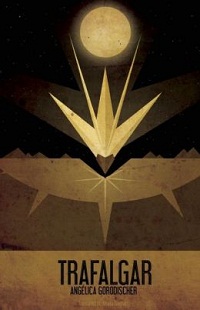“Time is not successive,” he said. “It is concrete, constant, simultaneous, and not uniform.”
I don’t know how to describe Argentine writer Angélica Gorodischer’s Trafalgar, only the second of this award-winning author’s books to be made available in English. Translated by Amalia Gladhart and published by Small Beer Press, Trafalgar retains a conversational charm at once both luminous and quotidian. It is odd, and fluent; intriguing, and quiet; amiable and interesting: at one and the same time both deeply thoughtful and immensely playful.
A collection of récits, Trafalgar is linked by the character of Trafalgar Medrano, as he recounts incidents of his travels to other planets as a businessman. One of the narrative’s many conceits is to frame Trafalgar’s stories through the lens of Trafalgar himself, telling the tale in conversation. Trafalgar is science fiction, but it is not science fiction, exactly; rather it’s a series of thought experiments of the impossible, recounted matter-of-factly and lucidly.
Some examples of these include:
Another Earth of 1492, on the far side of the galaxy, the same as ours down to Isabella and Ferdinand, Columbus and the Inquisition;
A planet where all of time is concrete, simultaneous, where Trafalgar experiences the far future and the distant past between one day and the next;
A planet where the dead continue on just as before after death—
Hundreds of thousands of years ago, a comet passed by and the tail grazed González and it seems it liked the neighborhood because it returns every five years. I don’t remember what the comet was called or if it had a name: probably not, because it didn’t have a name the first time it passed. Every five years it renews the phenomenon of the suppression of some of the characteristics of death—rotting decorously, for example, and not appearing again unless it’s at the three-legged table of some charlatan. At least that was the explanation Ribka gave me and that everyone accepted as valid. There doesn’t seem to be another: there must be something in the tail of that comet and I have no interest in finding out what it is.
And more besides, none bland or straightforward, none given form with tedious handwavium but with a lively appreciation for improbabilities. Here we have a kind of magical realism for science fiction, a True History (à la Lucian, almost) but one where the marvels of the traveller’s story are accepted by the listener. Gorodischer doesn’t commit the wonder-killing sin of attempting to explain: the mechanics of the universe are not at stake, or even very much in question. What is at the heart of every incident, every interlude, is a luminous (if I may use that word yet again) exploration of humanity: love, power, death, the known and the unknown. There is a talent at work here that marries the numinous to the everyday, sketching places and people with a vibrant pen. Trafalgar demands nothing. Instead, it invites you—like a friendly stranger—to depths of contemplation, presenting itself in a mode I am completely unused to and yet find here to be entirely compelling.
Had I to choose five words to describe it, I would call it: quiet, contemplative, provoking, bizarre—and brilliant. Quite, quite brilliant.
It is not the kind of thing I would normally choose to read.
But now that I’ve read it, I am at liberty to inform you I found it delightful. Thought-provoking. Impressive. Brilliant.
(I’m repeating that word, aren’t I?)
Trafalgar is a work that defies my ability to describe incisively, without superlatives. Gorodischer’s skill and craft—and the skill of her translator—left me moved, and not unchanged. Small Beer Press has done us all a service by bringing it to an English-language audience.
“Because there are things that can’t be told,” said Trafalgar on that stormy day. “How do you say them? What name do you give them? What verbs do you use? Is there a suitable language for that?”
There is a suitable language for that. Gorodischer has claimed it for her own, with style and grace and a novel grasp of meaningful silences. Trafalgar is a work to make one quote Jalal al-Din Rumi:
Out beyond ideas of wrongdoing
and rightdoing there is a field.
I’ll meet you there.When the soul lies down in that grass
the world is too full to talk about.
Go. Read. I’ll meet you there.
Trafalgar is published by Small Beer Press. It is comes out on January 29.
Find Liz Bourke on Twitter @hawkwing_lb.










